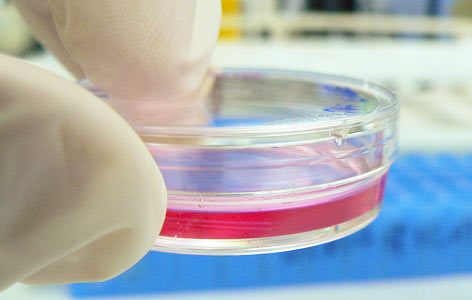
A good model system for scientific research is consistent and reproducible, making it easier to see the effects of your experiment. However, cancer is a disease that has a lot of variability between patients—sometimes even within a single tumour—and many new therapies that appear promising in preliminary studies fail in clinical trials.
A key limitation of experimental models is that they only use one type of cell, while tumours comprise many different cell types. Importantly, these models don't use the cells—known as cancer stem cells (CSCs)—that are thought to be responsible in some cancers for recurrence and treatment resistance.
PM Cancer Centre researcher Dr. Jean Wang and her colleagues have studied CSCs extensively. Recently, they used an experimental model of acute myeloid leukemia (AML) that more accurately reflects the disease. Derived from patient blood samples collected during treatment, this model, which is called a xenograft, captures many of the important clinical features of the human disease, including the presence of CSCs.
The researchers used the largest group of xenograft models reported to date (64 in total) to test the effect of an anticancer drug in AML. In close to 60% of the patient-derived models, the drug was shown to be effective, while the other 40% did not respond. This high degree of variability mirrored what would be expected in real patients in a clinical trial.
Moreover, by comparing the results from the xenograft models with complementary molecular analyses of the patient samples, the researchers were able to identify a biomarker that could be used to predict which models, and therefore which patients, were most likely to respond to the drug.
"Drugs that reduce tumour bulk may not necessarily work against all the cells in the cancer," comments Dr. Wang. "Our integrated approach provides a way to better identify which drugs should move on to clinical trials, while offering a path towards developing biomarkers that can tell us which patients will benefit."
This work was supported by the Canadian Institutes of Health Research, The Princess Margaret Cancer Foundation, the McEwen Centre for Regenerative Medicine, the Terry Fox Foundation, the Ontario Institute for Cancer Research, the Ontario Ministry of Health and Long-Term Care, and the Cancer Stem Cell Consortium with funding from the Government of Canada through Genome Canada and the Ontario Genomics Institute. J Dick holds a Tier 1 Canada Research Chair in Stem Cell Biology. Image source: Wikipedia.
An integrated analysis of heterogeneous drug responses in acute myeloid leukemia that enables the discovery of predictive biomarkers. Chen WC, Yuan JS, Xing Y, Mitchell A, Mbong N, Popescu AC, McLeod J, Gerhard G, Kennedy JA, Bogdanoski G, Lauriault S, Perdu S, Merkulova Y, Minden MD, Hogge DE, Guidos C, Dick JE, Wang JC. Cancer Research. doi: 10.1158/0008-5472.CAN-15-2743. 2016 Feb 1. [Pubmed abstract]




